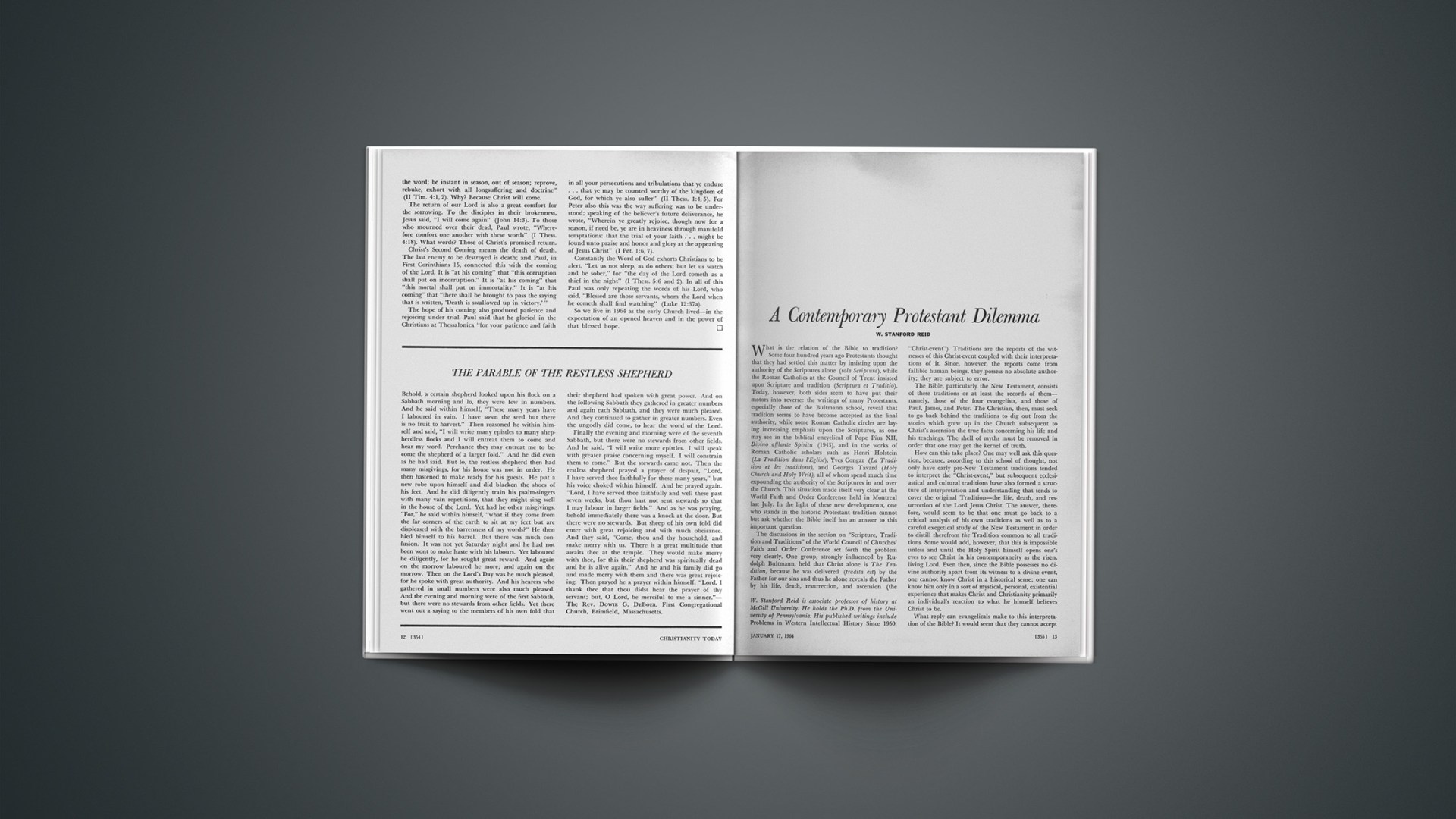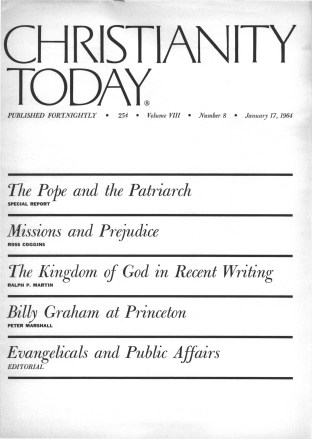What is the relation of the Bible to tradition? Some four hundred years ago Protestants thought that they had settled this matter by insisting upon the authority of the Scriptures alone (sola Scriptura), while the Roman Catholics at the Council of Trent insisted upon Scripture and tradition (Scriptura et Traditio). Today, however, both sides seem to have put their motors into reverse: the writings of many Protestants, especially those of the Bultmann school, reveal that tradition seems to have become accepted as the final authority, while some Roman Catholic circles are laying increasing emphasis upon the Scriptures, as one may see in the biblical encyclical of Pope Pius XII, Divino afflante Spiritu (1943), and in the works of Roman Catholic scholars such as Henri Holstein (La Tradition dans l’Eglise), Yves Congar (La Tradition et les traditions), and Georges Tavard (Holy Church and Holy Writ), all of whom spend much time expounding the authority of the Scriptures in and over the Church. This situation made itself very clear at the World Faith and Order Conference held in Montreal last July. In the light of these new developments, one who stands in the historic Protestant tradition cannot but ask whether the Bible itself has an answer to this important question.
The discussions in the section on “Scripture, Tradition and Traditions” of the World Council of Churches’ Faith and Order Conference set forth the problem very clearly. One group, strongly influenced by Rudolph Bultmann, held that Christ alone is The Tradition, because he was delivered (tradita est) by the Father for our sins and thus he alone reveals the Father by his life, death, resurrection, and ascension (the “Christ-event”). Traditions are the reports of the witnesses of this Christ-event coupled with their interpretations of it. Since, however, the reports come from fallible human beings, they possess no absolute authority; they are subject to error.
The Bible, particularly the New Testament, consists of these traditions or at least the records of them—namely, those of the four evangelists, and those of Paul, James, and Peter. The Christian, then, must seek to go back behind the traditions to dig out from the stories which grew up in the Church subsequent to Christ’s ascension the true facts concerning his life and his teachings. The shell of myths must be removed in order that one may get the kernel of truth.
How can this take place? One may well ask this question, because, according to this school of thought, not only have early pre-New Testament traditions tended to interpret the “Christ-event,” but subsequent ecclesiastical and cultural traditions have also formed a structure of interpretation and understanding that tends to cover the original Tradition—the life, death, and resurrection of the Lord Jesus Christ. The answer, therefore, would seem to be that one must go back to a critical analysis of his own traditions as well as to a careful exegetical study of the New Testament in order to distill therefrom the Tradition common to all traditions. Some would add, however, that this is impossible unless and until the Holy Spirit himself opens one’s eyes to see Christ in his contemporaneity as the risen, living Lord. Even then, since the Bible possesses no divine authority apart from its witness to a divine event, one cannot know Christ in a historical sense; one can know him only in a sort of mystical, personal, existential experience that makes Christ and Christianity primarily an individual’s reaction to what he himself believes Christ to be.
What reply can evangelicals make to this interpretation of the Bible? It would seem that they cannot accept such a position, one which denies the ultimate authority of the Scriptures for Christian faith and life. The evangelical response, therefore, usually is flatly negative, denying the truth of the modern existential position.
One cannot, however, let the matter rest there. One has to face the fact of tradition, even the tradition that formed the foundations of the Scriptures as mentioned in the opening of the Lucan writings, or in the Apostle Paul’s account of the origins of his own message in Galatians 1 and 2. Thus a Christian must look closely into the question of tradition in relation to the Bible.
An Accurate Portrayal
To begin with, the Christian must recognize that the New Testament came from the hands of the human authors of the books. But he also has the confidence that what they wrote accurately portrays Christ and records his teachings. This belief has recently received striking support from the work of a Swedish scholar, Birger Gerhardson, who in his work Memory and Manuscripts points out that the Jewish transmission of religious tradition in Christ’s days was extremely accurate and careful, and that it was in this context that Luke and the others wrote their Gospels. A good many years ago B. B. Warfield also pointed out that the early Church, whose members had known Christ personally, quickly recognized the accuracy of the Gospels and of the apostolic interpretation as found in the writings of Paul and others. Thus the writers of the New Testament would seem to have provided material of great historical accuracy.
Yet the Christian does not finally base his trust upon the discussions of scholars or upon historical arguments about human truthfulness. As he turns to the Scriptures he finds that the apostles, claiming to be the fountainhead of Christian tradition, assert that ultimately the accuracy of their information and interpretations results from divine inspiration and indeed in some cases originates in direct propositional divine revelation. For example, Peter on the Day of Pentecost claimed to set forth the message of Christ’s work by the Holy Spirit, while Paul, writing later to the Galatians and to the Corinthians, asserted that he had received the Gospel by divine revelation, the Gospel that in all aspects agreed with the message preached by “the pillars of the Church” in Jerusalem (1 Cor. 11:23; 15:8; Gal. 1 and 2). The tradition of Christ, therefore, was regarded by the apostles not as originating in man’s brain but as coming from the revelation and inspiration of the Holy Spirit.
For this reason the New Testament gradually took shape as the Church recognized those works that spoke not out of human tradition but by divine authority. Since the end of the second century, the Church has accepted the Bible as the Word of God written, in which we meet the Lord Jesus Christ, seeing him as he was on earth and as he is today, the risen, living Lord. Furthermore, only through the Spirit’s speaking to men in and through the Scriptures or through the message of the Scriptures do they encounter the Lord Jesus Christ in living faith and obedience. Thus the tradition contained in the Scriptures possesses authority, but only because it is the tradition that was given by the sovereign God.
The Roman Catholic Church would carry the idea of tradition beyond this, for, while it accepts the inspired character of the Scriptures, it insists that the tradition of the living Church also possesses divine authority. During the last five hundred years of its history, however, differences concerning even this tradition have arisen. While the Council of Trent in the sixteenth century apparently established the view that Scripture and tradition provided two equally valid sources of the knowledge of the truth in Christ, more recent Roman Catholic interpreters have stressed the place of tradition as the authoritative interpretation of the Scriptures. Thus, while the living tradition of the Church is important, it remains fundamentally subordinate to the Scriptures. On the other hand, the promulgation on purely traditional grounds of doctrines such as the Assumption of Mary seems to exalt tradition above Scripture. It is, therefore, not surprising that the present Vatican Council is so concerned to give this whole question of Scripture and tradition the most serious consideration.
Tradition And Authority
That the Christian Church has produced many different traditions during the past two millennia none may deny; but whether any tradition has final authority poses an important problem. A tradition may consist of a certain biblical interpretation, or it may have arisen from the Church’s adoption of ideas that have come from non-biblical sources. But in neither case may one cite a tradition as the final word for faith or life.
The ultimate test for all ecclesiastical traditions is the Scriptures of the Old and New Testament. Christ himself used this standard repeatedly in the Sermon on the Mount, while Paul and the other apostles used the same measuring rod when dealing with problems of tradition within the early Church (Col. 2). This means that the Church must continually refer its traditions back to the Bible, and this not infrequently has demanded radical church reform. The best example is seen in the sixteenth-century Reformation, although the principle still holds good even of the “Reformed tradition.”
But what of Christ as The Tradition? It would seem that to term Christ The Tradition because he was delivered (tradita est) for our sins is a rather poor Teutonic pun. Rather, he is the Lord of traditions. For it was he who spoke through the prophets and writers of the Old Testament as well as through the apostles in the New Testament. The Bible, then, is Christ’s tradition, which by the power of the Holy Spirit speaks to men with divine authority and which in Christ judges all their traditions.
W. Stanford Reid is associate professor of history at McGill University. He holds the Ph.D. from the University of Pennsylvania. His published writings include Problems in Western Intellectual History Since 1950.










